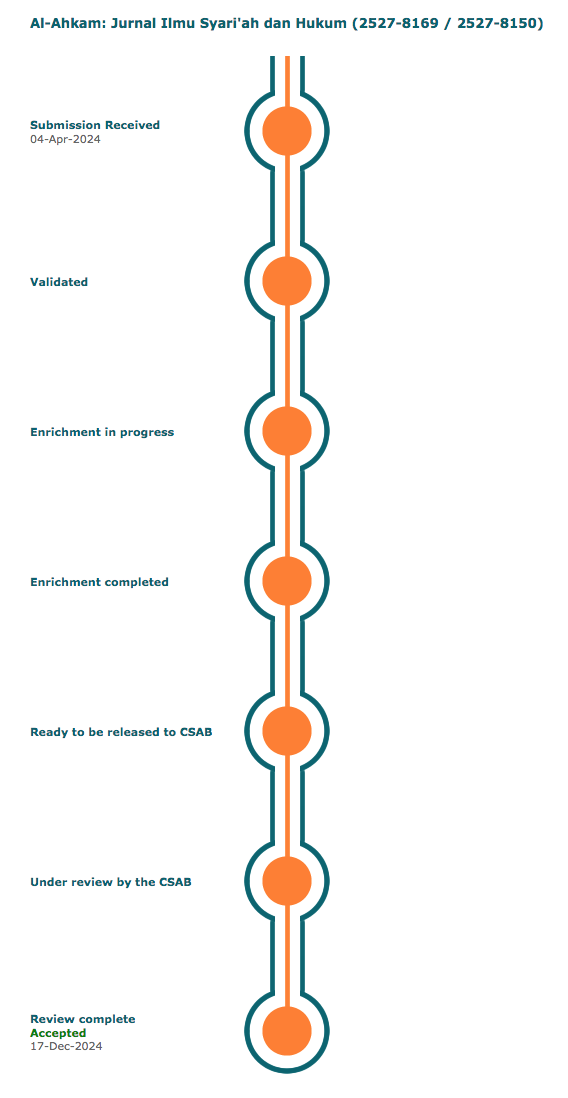Konstruksi Hukum Ekonomi Syariah Dalam Fiqh Anggaran Yang Bebasis Akuntansi Syariah
Downloads
The current global economic developments have implications for the welfare state. Limits and strength of the nation-state is fading, dispersed to the locality, independent organizations, civil society bodies supra-national (such as NAFTA or the European Union), and multinational corporations. Iin his book Mishra Globalization and Welfare State that globalization has limited the capacity of the nation-state in conducting social protection. One mode of latent corruption done is to inflate the budget or mark-up budget of raising the budget value than the actual value. Problems in this paper how the economic law of Islam respond to the phenomenon of corruption budget? How urgency and fiqh function of the budget in anticipation of corruption in Indonesia?. Through the budget, organization communicates management plans to all members of the organization, coordinating the activities of various parts of the organization, assigning responsibility to the manager, also obtained a commitment from the manager which is the basis for evaluating the performance of managers. Efforts should be made to anticipate and eradicate corruption in Indonesia, not merely intensified the inspection, investigation and arrest criminals only. Efforts to combat corruption and anticipation is not just by intensifying the campaign to strengthen a person's moral values. But building a budget fiqh ala Indonesia as a system for monitoring and controlling the budget both formal and community mechanisms, it should be held, despite the efforts of relatively still questionable results. It can happen because it will be many challenges and obstacles of the parties who are familiar with corruption. Solutions to uphold the integrity of the zone free / corruption of an institution by using sharia accounting principles in the management of the budget. Concrete forms of accounting shari'ah should be able to present a financial statement or budget management that is based on fairness, honesty, and truth as a form of implementation of the responsibility to fellow human beings and execution of commands (liabilities) of God.
Downloads
Affandi , Nur Achmad, (2005). “Hak Rakyat Atas APBD”, Kedaulatan Rakyat, 18 Pebruari 2005.
Anwar, Syamsul. (2007). Hukum Perjanjian Syari’ah. Jakarta: PT. Raja Grafindo Persada.
As’udi, Moh. dan Iwan Triyuwono. (2001). Akuntansi Syari’ah: Memformulasikan Konsep Laba dalam Konteks Metafora Zakat. Jakarta: Salemba Empat.
Asy-Syairazi, Abu Ishaq. (tt) al-Luma‘ fi Usul al-Fiqh, cet. 1 .Surabaya: Ahmad Bin Nabhan.
Dahlan , Abdul Azis..(et al). (1996). Ensiklopedi Hukum Islam, cet.1. Jakarta: Ichtiar Baru Van Hoeve.
Djazuli, H.A. (2006). Kaidah-kaidah Fikih: Kaidah-kaidah Hukum Islam Dalam Menyelesaikan Masalah-masalah Yang Praktis, Edisi Pertama, Cetakan Ke-1. Jakarta: Kencana Prenada Media Group.
Glenn A.Welsch, Budgeting Profit Planning and Control, fourth edition, (New Delhi: Prentice Hall of India Private Limited, 1981), hal. 3.
Hafidhuddin, Didin. (2003). Manajemen Syariah Dalam Praktik. Jakarta: Gema Insani Pers
Harahap, Sofwan Syafri. (2007). Krisis Akuntansi Kapitalis dan Peluang Akuntansi Syariah. Jakarta: Pustaka Quantum.
Harahap, Sofyan Syafri. (1999). Analisa Kritis atas Laporan Keuangan, Edisi Petama, Cetakan Kedua. Jakarta: PT. Raja Grafindo Persada.
Indonesia Corruption Watch, “Korupsi Anggaran”, Materi Training Jogjakarta, 29 Agustus – 1 September 2006
Ma’luf , Louis, (1973). al-Munjid fi al-Lugah wa al-Adab wa al-‘Ulum, cet. 22. Beirut: Dar al-Masyriq.
Mannan, Abdul . (2000). Membangun Islam Kaffah. Jakarta: Madina Pustaka.
Manzur, Ibn. (1973). Lisan al-‘Arab, II: 1119
Marzuki, Peter Mahmud. (2006). Penelitian hukum. Jakarta: Kencana.
Mishra, Ramesh. (2000). Globalization and the Welfare State. London: McMillan.
Motzki, Harald. (2000). The Origin of Islamic Jurisprudence: Meccan Fiqh before the Classical Schools. (Leiden-Boston-Koln: Brill,
Muhammad. (2002). Manajemen Bank Syariah, Yogyakarta: UPP AMP YKPN.
Naqvi , Syed Nawab Haider, (1994). Islam Economics and Society, London and New York: Kegan Paul International Ltd.
Qardhawi, Yusuf . (1997). Norma Dan Etika Ekonomi Islam. Jakarta: Gema Insani Press.
Sinn, Ahmad Ibrahim Abu. (2008). Manajemen Syariah: Sebuah Kajian Historis Dan Kontemporer, Jakarta: PT. Raja Grafindo Persada.
Sofwan Syafri Harahap. Krisis Akuntansi Kapitalis dan Peluang Akuntansi Syariah. Jakarta: Pustaka Quantum, 2007, hal. 120.
Syahatah, Husein. (1998). Ekonomi Rumah Tangga Muslim. Jakarta: Gema Insani Press.
Triyuwono, Iwan. (2000). Organisasi dan Akuntansi Syari'ah. Yogyakarta: LKiS.
Widodo, Hertanto dan Teten Kustiawan. (2001). Akuntansi dan Manajemen. Keuangan untuk Organisasi Pengelola Zakat. Jakarta : Institut Manajemen. Zakat.
Winardi, (1983). Azas-azas Manajemen, edisi ketujuh. Bandung: Penerbit Alumni.
Internet:
Admin, “Modus Korupsi”,dikutip dari http://www.transparansi.or.id/?pilih=lihataboutcorruption&id=7
Admin, “Penggelembungan Anggaran Modus laten Korupsi” dikutip dari http://www.anggaran.depkeu.go.id/web-content-list.asp?ContentId=88 diakses 13 Juli 2016
Admin, “Penggelembungan Anggaran Modus laten Korupsi” dikutip dari http://www.anggaran.depkeu.go.id/web-content-list.asp?ContentId=88 akses tanggal 10 Juni 2016
Administrator,”PengawasanPerspektif Islam”dikutipdari http://learning.fe.umy.ac.id/. accessed pada tanggal 1 Juni 2016.
Corruption Perception Index (CPI) 2014. http://www.ti.or.id/index.php/publication/2015/09/15/survei-persepsi-korupsi-2015 diakses 11 Juli 2016.
Hidayat, (2002b):431 https://imanph.wordpress.com/materi-kuliah/akuntansi-syariah/ diakses 5 Juni 2016
Iskandar Siregar, “Menuju Era Transparansi Anggaran”, dikutip dari http://www.kabarindonesia.com/berita.php?pil=20&jd=Menuju+Era+Transparansi+Anggaran&dn=20080627090126. diakses 7 Agustus 2015
Copyright (c) 2017 Agus Arwani

This work is licensed under a Creative Commons Attribution-ShareAlike 4.0 International License.







